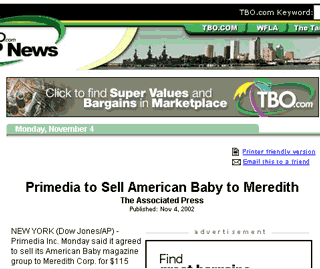AL'LL BE THERE FOR YOU: Andrew Sullivan reports that
"The final move in Al Gore's shift to the left came last week, according to ABCNews.com's The Note. He has now formally abandoned his earlier centrist position on healthcare and plumped for a Canadian single-payer system of the kind specifically avoided by Clinton."
Citing the example of a brain tumor patient in Britain who had to wait six weeks for urgently-needed radiotherapy from the National Health Service, Sully adds:
"...[I]n Britain, if you actually need good care, you have to both pay higher taxes and get private insurance - for healthcare inferior to much that is available here. This is what Al Gore wants to bring to America. At least now we know."
Now, what I do know is this: We could toss around anecdotal evidence until the wee hours, to "prove" that Socialized Health Care would be an epic disaster if it ever came to be in this country. But anecdotal evidence is not an intellectually honest debate tool. By focusing on the travails of a few unfortunate individuals, we're glossing over the "big picture" -- which includes some 40-odd million uninsured Americans who haven't luxury of being able to piss and moan about the cost of expedited, specialized treatment, when many of them can't even afford
ANY routine or preventive treatment at all.
But since Sullivan apparently places so much stock in anecdotal case studies, then let's take another case at random: Me.
I'm self-employed. I've been buying my own health insurance for 17 years. When I started my own stupid little graphics business back in 1985, I was able to secure an excellent small-business group policy for myself and one employee, for what amounted to 3% of my gross income.
Today, owing to a combination of skyrocketing inflation in heathcare costs and my own declining revenues in a difficult economy, that same policy would now cost me
20% of my gross earnings for 2002.
Without fail, every single year, I have been socked with a rate increase of between 10% and 17% -- until this year, when my insurer wanted to hit me up for a
30% increase. The only way I have been able to continue being insured
at all has been to systematically devalue the terms of the policy, so that each year I've ended up paying about the same for coverage that's a little worse than the year before.
The cumulative consequences have been devastating. Once upon a time, my annual deductible used to be as little as $100; now I have to spend
$2000 out of pocket before I get any sort of reimbursement. Emergency Room care used to be 100% covered; now, to discourage "casual" dependence on ER service for routine ailments, they sock me with a $500 deductible for each instance of ER care.
My co-payments for prescription drugs have also steadily increased. Three years ago, a 30-day supply of Celebrex capsules -- without which I would be literally crippled by osteoarthritis -- cost me, I think, $12 or $15 out of pocket. Last year I had to start paying $25 a month. This year it's $50. (In about four weeks, my insurance agent is going to give me a courtesy call right before they announce the new rates for 2003, and it wouldn't surprise me a bit if the first words out of her mouth were "Brace yourself...")
So riddle me this, Sully: You make a pretty good income. Even your blog does better than break-even. I know you have some serious medical and pharmaceutical bills to contend with, but you're obviously managing okay. For now.
But what are you planning to do when
even you can no longer afford the best health care in the world? How many more years of consecutive double-digit percent increases can you stomach, before
even you have to start weighing the urgency of your next regularly-scheduled medical exam against the cost of groceries?
Maybe pure socialized health care is not the answer. I'm not claiming to have all the answers. But one thing I do know is this: Free-market health care is as much a scandal, in its own right, as the worst horror stories you've ever heard about rationed health care in Canada and Britain. We already impose our own brand of rationing in America, by making our health care unaffordable to all but the rich and moderately well-off. Possibly, only the chattering classes who have comandeered the debate -- among which I would certainly include professional journalist Andrew Sullivan -- have failed to notice.
Scandal? Let's say I had actually suffered some sort of catastrophic health crisis this year. Suppose I had to spend two weeks in the hospital because I'd come down with inhalation anthrax -- and that I was also one of the lucky survivors who lived to see the hospital's bill. Two weeks of round-the-clock critical care? I'd have run up a tab of at least $25,000 or $30,000, easily.
So I get this enormous bill which I can't possibly pay, and I submit the claim to my insurer. What happens next? Under free-market care, my insurance company almost invariably refuses to pay my claim at first. Then I start exchanging correspondence and phone calls, retrieving my hospital chart, submitting documentation, jumping through all manner of hoops to "prove" that I was actually sick, and that my illness falls within the insurer's standard definition of "covered critical care."
In the private insurance racket, this is standard practice. It's the little game they play, to make money on the "float." By stalling payouts on large claims, the insurance company's cash-on-hand is allowed to sit in a money market fund, earning interest -- while I have to exhaust every line of credit I've got, to make at least a good-faith partial payment on my enormous debt.
But if I can't cover the hospital's bill in its entirety while the insurer's claim check is still "in processing," the bill remains my legal responsibility -- and at some point, the hospital has to look out for its own best interests instead of mine. So after 120 days or so, the hospital's attorneys will seek a legal judgment against me -- and if I still haven't paid the bill (plus accumulated late fees and legal costs) by the time the court issues the judgment, the hospital can then levy my bank account or engage the local Sheriff to sieze my property to satisfy the judgment.
And here's the
real scandal: As the size of the bill increases, so does the incentive become even greater for the insurance company to deny payment for a longer period time. Above a certain threshold, I would not expect to have my claim honored
at all -- at least, not until I've engaged the services of attorney to write threatening letters on my behalf (and of course, at my expense).
Yup. That's the power of free-market health care at work. Somehow, for all of their fraught speculations on the downside of socialized medicine, Harry and Louise never managed to notice a downside to the status quo. (Except, occasionally, in
Tom Tomorrow's fevered imagination.)
After 17 years of paying the equivalent of a stiff tax to private insurers instead of to the Federal coffers, the only improvement has been the phase-in of tax-deductibility on my monthly premiums. It helps -- but this deduction is actually worth surprisingly less than you'd think. It would be something else again if the IRS tax code awarded me a tax
CREDIT for the amount of my health insurance premiums, up to some reasonable limit. But for those of you who simply take the standard deduction on your 1040 short form and never think much about the complexities of itemizing, you should understand that a
deduction is a far cry from a tax
credit. They are very different animals indeed.
Sidebar:
A tax credit is like a coupon for 50˘ off your next purchase of Bounty paper towels. Simple. Straightforward. If the product normally retails for $1.19 and Bounty has given you a 50˘ Paper Towel Credit, all you need do is to present the coupon to the cashier and your final cost is 69˘. End of story.
Whereas, a tax deduction would be akin to the grocery store using a complex formula to assess your income and expenses -- which you must be able to document assiduously -- and then, if all the pieces of the puzzle come together in your favor, the store reduces the total cost of your purchase by maybe a fraction of a percent. You'll have to come up with a lot more deductions if you expect to save any real money.
More to the point -- Income Tax deductibility reduces my entrepreneur's regressive,
self-employement double-FICA payroll tax by
not one whit. You see, since the self-employed are both the employer and employee, we have to contribute twice as much to the Social Security lockbox as an ordinary salaried employee working for an ordinary company. This has usually been, for me, a
far greater tax burden than ordinary income tax ever was.
Critics of single-payer socialized medicine are always quick to insist that it will force services to be rationed, and lower the standard of excellent medical care that is presently available in this country. As in all other things, socialism -- they say -- is not a rising tide that raises all boats; it's a falling tide that will only ground the luxury yachts on the shoals, along with every other little sputtering tug and dilapidated skiff.
To them, I say: "Brace yourself."
The day is coming when you too, Andrew Sullivan, will no longer be easily able to afford high-quality American medicine. I wonder what country you'll flee to, then.
Which is not to say that I'm now preparing to throw my support back to Al Gore because he's got a plan to wring Free Medical Care out of thin air. In the first place, Gore has no plan. He's merely espoused an ideology. And in any case, I know it won't be free. Of course a real USA Single-Payer plan would come out of a new tax initiative.
But instead of reflexively trotting out the old, weatherbeaten scare-arguments -- which have been stripped down to PowerPoint bullet-point summaries and repeated so often that they've lost all meaning -- I wish some critics of Hillarycare (perhaps now to be rechristened AlCare -- "I'll Care" -- get it?) would explain why I'm so much better off paying the equivalent of a stiff tax straight into the United Healthcare Slushfund Lockbox every month, while simultaneously enduring the bureaucratic nightmare required to get a legitimate claim reimbursed under StatusQuoCare, and worrying if that noise I just heard was the Repo Man hauling away my Honda Civic.
The comments section is open. Fill the room with your brilliance!
UPDATE #1: Here's at least
one Canadian who agrees.
UPDATE #2: I got
Kuffner in my corner, too.







